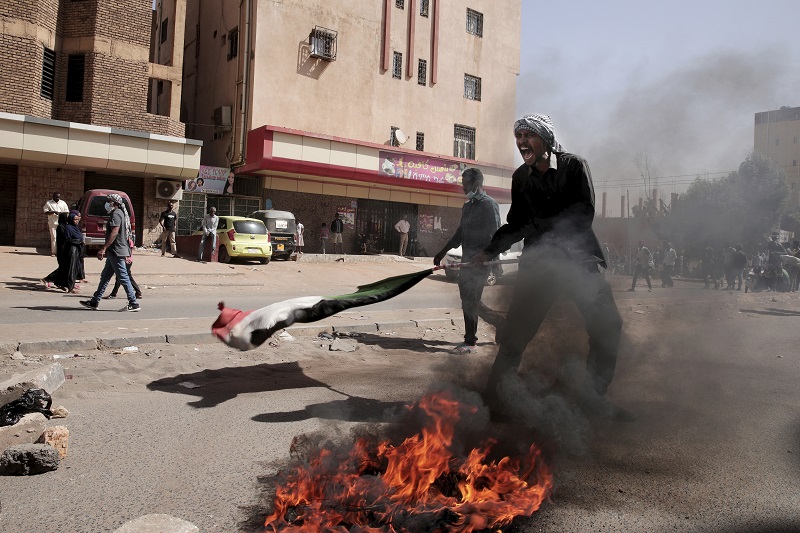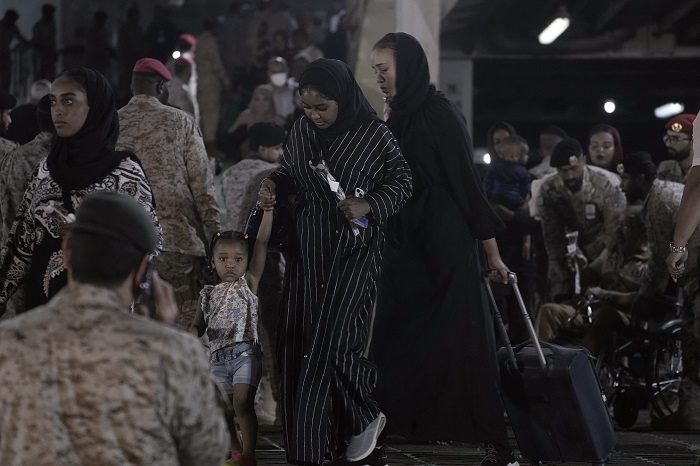Mudathir Hameed and Eva Krafczyk
dpa
Omdurman, Sudan — A capital in ruins and a country with no clear path out of the bloodshed and violence: two years into Sudan’s civil war, an accurate death toll from the conflict remains unclear.
The United Nations estimates that more than 20,000 people have died. However, there are also estimates of up to 150,000 dead, according to the International Rescue Committee (IRC).
Since the Sudanese army recaptured the capital Khartoum in March, harrowing images have surfaced on social media showing emaciated torture victims and prisoners held by the rival Rapid Support Forces (RSF), many reduced to little more than skeletons.
Some were so weakened that they died shortly after their liberation.
Now, images of mass graves and the victims of violence left behind in empty flats contrast with the first signs of new life in Khartoum.
The city centre resembles a ghost town full of burnt-out buildings and shot-up vehicles. In other parts of the city, the first inhabitants are venturing back.
A dpa reporter observed: “Most of them want to see whether their houses are still standing and whether their belongings have been looted.”
In some neighbourhoods, tea vendors are once again waiting for customers at the crossroads and children are playing football in the streets. But food, not only in Khartoum, is around three times as expensive as it was before the civil war.
Sudan: ‘World’s largest humanitarian crisis’
Two years on, the humanitarian situation in Sudan is bleak. Almost 13 million people have been displaced and 25 million people are at risk of acute hunger, warns Shaun Hughes, responsible for Sudan at the UN World Food Programme (WFP).
“By any metric, this is the world’s largest humanitarian crisis in terms of displacement,” he says. “Nearly five million children and mothers are acutely malnourished.”
“The scale of what is happening in Sudan threatens to dwarf much of what we have seen in recent decades.”
A forgotten crisis, aid plans without funding
The conflict erupted in Sudan on April 15, 2023 between the armed forces and the RSF militia.

It began as a power struggle between former Sudanese vice president Mohammed Hamdan Daglo’s RSF and the armed forces led by the de facto president, Abdel Fattah al-Burhan.
The two generals originally seized power together in 2021 and are now fighting each other.
Multiple diplomatic efforts to broker a ceasefire and launch peace negotiations have failed.
Human rights organizations accuse both sides of committing war crimes – including indiscriminate bombings by government forces and widespread atrocities by Daglo’s RSF militia, such as sexual violence, summary executions and ethnic cleansing.
Many aid organizations have voiced frustration that Sudan’s crisis receives far less global attention than the wars in the Middle East and Ukraine – reflected not only in media coverage but also in funding.
So far, only 10% of the funds for the International Relief Plan for Sudan have arrived. According to the plan, $1.8 billion are needed.
Expectations are therefore high for a donor conference in London on Tuesday. More than 30 million people in the country of over 50 million are dependent on aid.
Is Sudan headed for partition?
Though the army’s recapture of Khartoum marked a symbolic victory, the RSF continues to control vast parts of western Sudan.
In the North Darfur region, the government’s last major stronghold, El Fasher has been under siege for nearly a year.
The RSF has declared its intention to form a parallel government together with other political and military groups in the areas it occupies, meaning the country could be threatened with further division.
After decades of civil war, South Sudan officially became independent from Sudan in 2011 when the state was founded.
A proxy war with consequences beyond Sudan
In its most recent analysis of the conflict, the think tank International Crisis Group believes that an escalation is likely – particularly with regard to the role of other states.
Instead of using the progress made in controlling the capital “to pursue peace, the army appears to want to press on for total victory, while the RSF aims to expand the war to new areas,” it says.
“Both sides are still receiving ample outside support to continue fighting.”
According to the International Crisis Group, while the Sudanese army receives political support and arms supplies from Arab states, particularly Egypt, the RSF is backed primarily by the United Arab Emirates.
The involvement of the rebel group Sudan People’s Liberation Movement (SPLM)-North, which has traditional links to South Sudan, in the planned parallel government also increases the risk of the conflict spreading.
Destabilization of the region feared
Signs of regional destabilization are already emerging. Chad and South Sudan – two of the world’s poorest and most fragile nations – have become key hosts for Sudanese refugees.
“The Sudan conflict threatens to destabilize an already fragile region, with cascading effects on security, economies, and social tensions,” reads a report by the International Committee of the Red Cross (ICRC) on the second anniversary of the conflict.
“Vulnerable communities living in areas with limited resources cannot face this massive crisis alone.”
Weapon supply routes for the RSF in Darfur run through Chad, while South Sudan is suffering economically due to disrupted oil production. The pipeline that transports crude through both countries was offline for months.
Meanwhile, internal tensions in South Sudan are also rising, as political rivalries between President Salva Kiir and Vice President Riek Machar deepen.
Analysts warn that the risk of renewed civil war there is growing.
©2025 dpa GmbH. Distributed by Tribune Content Agency, LLC.
Some years ago, the BBC reported that one of Sudan’s Ministers was blaming Israel for the unrest and riots taking place then.
Sudan blames Israel for Khartoum arms factory blast
The Sudanese government says it believes Israel was responsible for explosions at a military factory in the capital Khartoum on Tuesday.
Culture and Information Minister Ahmed Bilal Osman said four Israeli planes attacked the factory and two people were killed. Israel has not commented.
Sudan has blamed Israel for such attacks in the past.
Correspondents say Israel believes weapons are being smuggled through the region to Gaza.
Last year, Strategic Culture published an article about Sudan’s ongoing civil war:
udan’s ‘Forgotten War’ Leads to Epic Suffering and Regional Instability
By Jean Shaoul
Last week, United Nations (UN) relief agencies warned the Security Council that Sudan is suffering one of the world’s worst humanitarian crises in recent history, after nearly a year of gruesome fighting between rival factions of the Sudanese armed forces for control of the country.
Sudan faces a famine of biblical proportions because of the war, displacement, the breakdown of the economy and the almost total absence of international aid. Many buildings in the capital Khartoum have been destroyed. The government, virtually bankrupt, barely functions.


